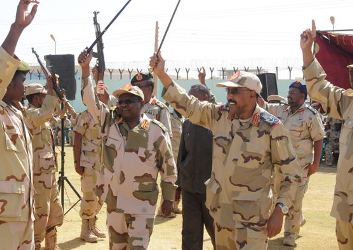Sudan launches military operations against rebels in multiple states
November 12, 2013 (KHARTOUM) – The Sudanese defense minister, Abdel-Rahim Mohamed Hussein, announced the beginning of military operations which aims to end rebellion in Darfur, South Kordofan, and Blue Nile.

He affirmed the completion of preparations, plans and the simultaneous mechanical movement in the various battlefronts.
“We made huge and excellent preparations and our troops are moving to end the rebellion once and for good”, Hussein said.
The country’s top military official, who testified before the parliament on Tuesday, acknowledged that performance of the armed forces in Darfur was negatively affected by the lack of capacity of the police, saying that the armed forces directed its efforts to control the tribal clashes instead of carrying out its military tasks.
He claimed that the rebel coalition known as Sudan Revolutionary Front (SRF) that consists of the Sudanese People’s Liberation Movement/North (SPLM-N) and several Darfur rebel groups plan to carry out assassination and kidnapping operations against government officials as well as attacking major cities.
Hussein acknowledged that wars in Darfur, South Kordofan, and Blue Nile along with the tribal conflicts and armed robbery in Darfur represent a real security threat.
He said that the rebel Sudan Liberation Movement/Minni Minnawi (SLM-MM) and Sudan Liberation Movement Abdul Wahid (SLM-AW) are currently active in Darfur states in cooperation with some tribal groups.
The defense minister added that SLM-MM is the largest rebel group in Darfur, affirming that it plays the most significant role in the lack of security and stability in the region.
He predicted that rebel groups would attack the army’s small stations in Jebel Marra besides targeting major cities, the United Nations African Mission in Darfur (UNAMID) forces, and oil exploration sites.
Hussein added that the SRF forces in South Kordofan are estimated to consist of 1,000 troops and more than 130 vehicles while the SPLM-N alone has 18 battalions including approximately 8,000 troops.
He revealed that the government reached an agreement with two armed factions that are active in west and central Darfur states, pointing that this pact would enhance stability of the two states.
The Sudanese presidential assistant, Nafie Ali Nafie, had announced previously that troops are heading to Darfur, South Kordofan, and Blue Nile, saying that the government troops would carry out a major military campaign to eliminate the armed rebellion.
The minister of interior, Ibrahim Mahmoud Hamid, also said that the military campaign is carried out under the direct supervision of president Omer Hassan Al-Bashir.
Darfur has been a flashpoint for lawlessness and violence since rebel movements took up arms against the Khartoum government in 2003.
Since 2011 the SPLM-N have fought the Sudan Armed Forces (SAF) and their aligned militia the Popular Defence Forces (PDF).
The conflict began in South Kordofan State in June 2011 and in Blue Nile State in September the same year.
On a separate issue, Hussein said that a joint Sudanese and Egyptian force similar to those which were set up with other neighboring countries would be formed to fight against smuggling and human trafficking.
He pointed that borders crossings’ committees between Sudan and Egypt would convene soon to decide on the dates for opening these crossings.
The Sudanese official said that they are discussing with the Libyan side the possibility of increasing the size of the joint force between the two countries in order to fight arms smuggling, rebels, mercenaries, and bandits.
(ST)
